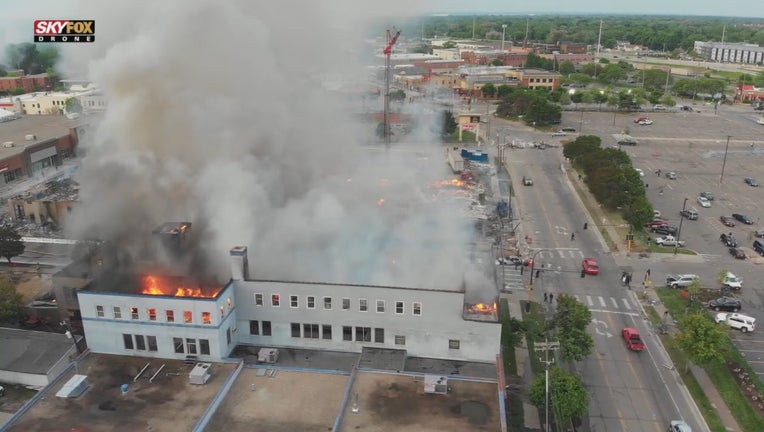Republicans tie Minneapolis, St. Paul recovery aid to rioting investigation

Hundreds of businesses and buildings were damaged or destroyed in the riots that followed George Floyd's death. (FOX 9)
ST. PAUL, Minn. (FOX 9) - Republicans who control the Minnesota Senate are tying recovery aid for businesses damaged or destroyed in recent rioting to a GOP-led investigation of shortcomings in the government response to the unrest.
Senate Majority Leader Paul Gazelka referred to the aid as a "bailout," and the shift in tone makes it unlikely that business owners in Minneapolis and St. Paul will see relief money soon. Lawmakers failed to pass the aid in a special session this month that ended in stalemate.

Relief money uncertain for businesses impacted by riots
Recovery money for twin cities businesses destroyed in the rioting takes a hit as the top Senate Republican dismisses it as a bailout.
City and state officials were unable to control the unrest for four days after the death of George Floyd, a Black man who died after a now-fired Minneapolis police officer pinned him to the ground by keeping his knee on Floyd's neck for several minutes. Hundreds of businesses were looted, burned or damaged. Gazelka said people in GOP districts wanted to know why government officials allowed the rioting to continue.
"In my district, I can tell you they’re very upset these things are happening without seemingly any desire to stop it," said Gazelka, R-East Gull Lake. "I can tell you they’re very concerned that Minneapolis and St. Paul then would be asked to be bailed out by the entire state."
Asked to clarify whether Senate Republicans were taking recovery aid off the table, a spokesman for Senate Republicans said, "We're not going to be bailing out Minneapolis and St. Paul without a thorough investigation into the decisions made by local and state leaders."
Senate Republicans have vowed to start oversight hearings into the unrest on Wednesday.
Democrats criticized Gazelka for using the term "bailout," and said it was inappropriate to tie the government response to the needs of small business owners.
"I think they’re trying to change the narrative," state Rep. Mohamud Noor, DFL-Minneapolis, said in an interview outside a destroyed pawn shop in his neighborhood. "They had no connection. Nobody asked for this destruction. Nobody asked for their businesses to be looted."
During this month's special session, the DFL-controlled House passed a $300 million relief package sponsored by Noor. Most of the money would be available for cash grants to businesses. A special master would dole out some of the funding through a victims' relief account similar to one created after the Interstate 35W bridge collapsed in 2007.
The relief bill calls for a one-eighth cent sales tax increase in the seven-county Metro. It would also allow Minneapolis and St. Paul use eminent domain to block certain redevelopment in affected areas to prevent gentrification.
The bill passed the House 74-53, mostly along party lines. The Senate did not take action on the relief bill.
"We've got to send the message that we don’t want you to fail," Noor said. "At this point, I think it is a disaster for us to walk away from the small business owners."
The House package creates a civil unrest investigatory commission to write a report detailing the government's failure to control the rioting. The 10-member panel would be appointed by Minnesota Supreme Court Chief Justice Lorie Gildea.
But Senate Republicans prefer to do the investigation themselves. The GOP has created an oversight committee that state Sen. Scott Newman, R-Hutchinson, will chair.
Gazelka said Democratic senators would serve on the committee. But DFL leaders said Thursday that none of them had been invited.
It's unclear when Gov. Tim Walz will call lawmakers back for a second special session. Walz considered doing so immediately after the first overtime period ended in failure, but there's been no agreement on several key issues.
It's likely that no special session would start before July 12, when Walz must call lawmakers back if he extends his peacetime emergency powers over the state's response to the coronavirus pandemic.
Lawmakers from both parties said the two sides appeared to be talking past each other in the first special session. The House is led by Metro-area Democrats, while the Senate is controlled by Republicans from greater Minnesota.
"I don't know if it's (the urban-rural divide) worse now or not," Gazelka told reporters this week. "What I will say is there's more tension in general."

